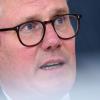Creating your personal brand


What is your personal brand? How current is your brand in these challenging economic times? Your brand should encompass your strengths, talents, authenticity, values and beliefs. It’s about making you identifiable as unique and ensures you stand out from the crowd. It needs to evolve with the landscape and in line with your career and life aspirations.
It’s important because it’s about seeing yourself as a product; managing what is recognisable about yourself. Think about what you stand for from the perspective of what the other guy sees. How are you perceived by your peers, colleagues, suppliers, customers and friends?
How would you describe your own personal impact? What are your USPs (unique selling points)? For example, you might say approachable, dynamic and knowledgeable. The word ‘professional’ is a given. How do others describe your personal impact? In other words how are you marketing yourself? Remember most of the information we process is visual but don’t forget your written brand, how you look on LinkedIn, your networked self.
Visual impact is a key part of our communication armoury. So how do you package your strengths, talents, values and beliefs? Is that packaging congruent with what you stand for and reflected in how you look, sound and behave? Personal branding is about how you present yourself to others, what makes you memorable.
Research says that the actual content of what we’re saying accounts for just 7% of what we communicate. So how you look, how you sound and your body language counts for a lot about you.
We know that first impressions are important and research shows that over 93% of our first impression is based on how we visually present ourselves to others. So you need to ensure that you make an instant and positive impact. There is a real need for self-awareness here and ensuring your behaviour is consistent with your projected brand. If you say you are meticulous don’t hand out a CV with typos in it; if you claim to be reliable don’t turn up late for meetings.
Your brand is how you project yourself to the world. Decide what to say or write in order to convey a certain image. Your projected image influences what others think of you and how they might choose to interact with you. Awareness of what others see will help you to identify blind spots and deal with practical problems or self-projection.
Research shows that you have up to five seconds to make that instant impact.
Think about these questions:
· What do you want people to say about you?
· What do people perceive when you walk into a room?
· Is your brand current and representative of your future aspirations?
If you described yourself as an excellent communicator, competent and detail orientated is this congruent with how you look, sound and behave? Are you punctual? Is there a button missing from your cuff? If you are late can you explain fluently and convincingly and charmingly why you were late? Are you on message?
It’s not just about image. A good cut and colour are great. A spiffy suit and new shirt help but a superficial image that doesn’t reflect your individuality and personality will be transparently and obviously unauthentic. So start by understanding exactly who you are, what you’re capable of and where you want to go. And make sure that it’s the real deal; align your personal brand so that you build a stable basis to exhibit your trustworthiness, credibility and personal charisma.
So now define your attributes and ambitions into a statement of what you want your visible brand to be. Work on personal brand statement. Then actively engage in living up to that statement and creatively showing off your brand. It’s commonsense but, if it’s authentic, the most important thing is that it should boost your confidence. Self-esteem is about how you see yourself and personal branding is about how others see you.
Your personal brand is reflected in what people say about you after they meet you. But don’t just concentrate on first impressions. What about the lasting impression you make on others? What is your MacGuffin? What is it about you that catches the attention of others? Justin Urquhart Stewart has his red braces; John McCririck has his hat; Janet Street-Porter the big glasses. It doesn’t have to be something so outrageous butistinctive. Something people will remember when they see you again.
Michael Moran is chief executive, Fairplace




